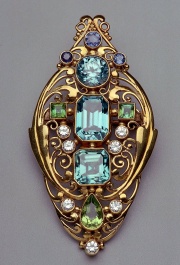Difference between revisions of "Peridot"
m (Text replace - "== Authority ==" to "== Sources Checked for Data in Record ==") |
m (Text replace - "\[http:\/\/cameo\.mfa\.org\/materials\/fullrecord\.asp\?name=([^\s]+)\s(.*)\]" to "$2") |
||
| Line 2: | Line 2: | ||
== Description == | == Description == | ||
| − | A transparent, yellow-green [ | + | A transparent, yellow-green [[gemstone|gemstone]]. Peridot is a transparent form of [[olivine|olivine]] that was known in ancient Greece and in Egypt. Many of the green stones worn by Cleopatra were peridot. The main old world source for peridot was the island of Zabargad (St. John's Island) in the Red Sea. Peridot was called an evening emerald because it appears to lose its yellowish cast at night. It has sometimes been misidentified as emerald and as green glass. Former names include topaz (Greek) and zerberdjet (Persian). Peridots are still obtained from Zabargad and also from Brazil (Minas Gerais), South Africa, Kenya, China, Myanmar (formerly Burma, near Mogok), Norway (Sondmore), and the U.S. (Arizona, Hawaii). |
== Synonyms and Related Terms == | == Synonyms and Related Terms == | ||
Revision as of 11:12, 10 May 2016
Description
A transparent, yellow-green Gemstone. Peridot is a transparent form of Olivine that was known in ancient Greece and in Egypt. Many of the green stones worn by Cleopatra were peridot. The main old world source for peridot was the island of Zabargad (St. John's Island) in the Red Sea. Peridot was called an evening emerald because it appears to lose its yellowish cast at night. It has sometimes been misidentified as emerald and as green glass. Former names include topaz (Greek) and zerberdjet (Persian). Peridots are still obtained from Zabargad and also from Brazil (Minas Gerais), South Africa, Kenya, China, Myanmar (formerly Burma, near Mogok), Norway (Sondmore), and the U.S. (Arizona, Hawaii).
Synonyms and Related Terms
olivine; zeberdjet; evening emerald; olivine, péridot (Fr.); peridoto (Esp., Port.); Peridot (Deut.); peridoot (Ned.)
Other Properties
Orthorhombic crystal system.
Fracture = conchoidal to uneven. Luster = vitreous. Streak = colorless.
Fluorescence = none
| Composition | (Mg,Fe)2SiO4 |
|---|---|
| Mohs Hardness | 6.5 |
| Density | 3.22-3.40 |
| Refractive Index | 1.650-1.690 |
Comparisons
Properties of Common Gemstones
Sources Checked for Data in Record
- G.S.Brady, Materials Handbook, McGraw-Hill Book Co., New York, 1971 Comment: p. 561
- Jack Odgen, Jewellery of the Ancient World, Rizzoli International Publications Inc., New York City, 1982
- R.F.Symmes, T.T.Harding, Paul Taylor, Rocks, Fossils and Gems, DK Publishing, Inc., New York City, 1997
- Website address 1 Comment: http://www.geo.utexas.edu/courses/347k/redesign/gem_notes/Peridot/peridot_triple_page.htm
- Yasukazu Suwa, Gemstones: Quality and Value, Volume 1, Sekai Bunka Publishing Inc., Tokyo, 1999
- Michael O'Donoghue and Louise Joyner, Identification of Gemstones, Butterworth-Heinemann, Oxford, 2003
